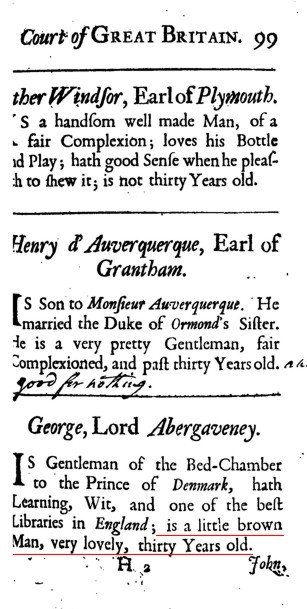William Nevill, 16th Baron Bergavenny

This is from the book called Memoirs of the Secret Services of John Macky and it say George Nevill, 1st Earl of Abergavenny is a brown man which means he is a black but William Nevill, 16th Baron Bergavenny is his father so he must also be black too since they are father and son.
William Nevill, 16th Baron Bergavenny (died 1744), was an English peer and courtier who held positions in the Royal Household and built a country mansion in Sussex.[1]
Origins
Born about 1698, he was the only son of Edward Nevill (1664 – 1701), a Captain in the Royal Navy, who died aboard HMS Lincoln off the coast of Virginia, and his wife Hannah Thorpe (1668 – 1764), daughter of Gervase Thorpe (died 1716),[1] who lived at Brockhurst,[2] near East Grinstead.
Life
On the death without children of his first cousin Edward Nevill, 15th Baron Bergavenny, he succeeded to the barony, taking his seat in the House of Lords on 12 November 1724. Deciding to leave the ancient family house at Birling in Kent, he sold inherited lands and applied the proceeds to buy a block of farmland in Forest Row, where he created a park and built in it the mansion of Kidbrooke Park,[1][3] since altered into Michael Hall School.[4] In 1737 he obtained the post of Captain of the Yeomen of the Guard and in 1739 was appointed Master of the Jewel Office. He died in Bath on 21 September 1744 and was buried at East Grinstead, being succeeded in the barony by his eldest son.[1]
Family
On 20 May 1725 he married Catherine Tatton, widow of the previous baron. She was the elder daughter of Lieutenant-General William Tatton and his first wife Elizabeth Bull, sister of Sir John Bull. After having two children, George Nevill to whom King George II was godfather, and Catherine Nevill, she died giving birth to a third child Edward Nevill, on 4 December 1729. Shortly after her death, he was awarded 10,000 pounds in damages, worth over 1.6 million pounds in 2022, in a law case brought against his former friend Richard Lydell for criminal conversation with her.[1][5] An obituary poem called her: “Young, thoughtless, gay, unfortunately fair.”[1]
On 20 May 1732 he married Lady Rebecca Herbert (died 20 October 1758), daughter of Thomas Herbert, 8th Earl of Pembroke and his wife Margaret Sawyer,[1] with whom he had four children: William Nevill, Harriet Nevill, Mary Nevill, and Sophia Nevill.
What's Your Reaction?




















